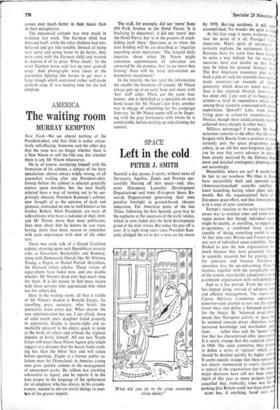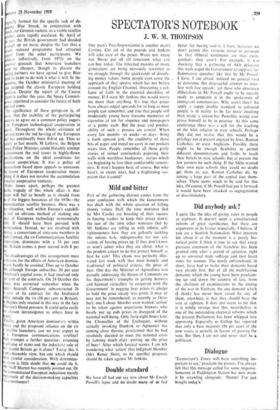Left in the cold
SPACE
PETER J. SMITH Scarcely a day passes, it seems, without news of Surveyors, Apollos, Zonds and Protons suc- cessfully blasting off into space—and, alas; ELDO (European Launcher Development Organisation) and nsao (European Space Re- search Organisation) generating their own peculiar limelight in ground-based, chronic indecision. The American panic of the late 'fifties, following the first Sputnik, gave way to the euphoria at the successes of the early 'sixties, which in turn faded into the hard development grind of the mid-'sixties. But today the pay-off is near. It is eight long years since President Ken- nedy pledged the us to put a man on the moon
'What did you do in the great monetary crisis, daddy?' by 1970. Barring accidents, it will soon accomplished. No wonder the spirit is risin At this late stage it seems irrelevant to q Lion the point of it all. Prestige? Certa important. Man's spirit of adventure? certainly explains the excitement. Fear? Russians have for some time been thought be quite a way behind; but -the recent Z successes have cast doubts on this. Not may be taken for granted. Science? A li The first American moonmen plan to b back a pile of rock for scientific investigatio many countries—an example of Amen generosity which deserves much more pr than it has received. Overall, however, s has spent only 2 per cent of its budget on t science—a level of expenditure which ran among those scientists concerned with planet exploration. Spin-off? Lots, from non-s frying pans to colour-Tv transmissions fr Mexico, though these could certainly have b achieved more cheaply in other ways.
Military advantage? I wonder. Mr Nix notorious remarks to the effect that the us m bargain with Russia from a position of stren certainly puts the space programme, am others, in an old but near-forgotten light. can be sure that every advance in space been closely analysed by the Defence Dep ment and detailed contingency planning carr out accordingly.
Meanwhile, where are we? It would har be fair to say nowhere. We (that is, Euro have successfully huilt and operated sex (American-launched) scientific satellites, latest launching having taken place only I month. But the organisational basis of European space effort, and thus future plann is in a state of utter conftIsion.
Europe's reaction to the early USA-USSR s cesses was to institute ESRO and ELDO with vague notion that though individual count might be unable, or unwilling, to support sp programmes, a combined force' would capable of 'doing something useful in spa At that time only Britain and France posse any sort of individual space capability. The r flocked to join the new organisations not much because they were genuinely intere in scientific research but for prestige, ho for contracts and because European operation was the up-and-coming thing. S motives, together with the inexplicable du of the system, were hardly calculated to prod a coherent organisation with well-defined a, And so it has proved. From the start, has limped along, starved of adequate sup and efficient management. The report of Causse Advisory Committee represented none-too-soon attempt 1C) sort out the organ! tional mess and define a balanced program for the future. By 'balanced programme meant that 'European activity in space she be oriented towards direct objectives, nam increased knowledge and worthwhile appl tions . rather than seek the "power" ob tive that has characterised other space polic It is surely strange that this required reitera in 1968. The same committee then proce to define a series of 'options' which, it should be decided quickly by higher autha It seems equally strange that these options N% not clearly enumerated at Esao's inception• is typical of the organisation that the nece major decisions have still not been taken• April of this year so many projects had cancelled that, ironically, ESRO was left nothing that Britain could not have done a ELDO has, if anything, fared even WO 'ginally formed for the specific task of de- oping Blue Streak, in conjunction with rench and German rockets, as a viable satellite ocher, costs rapidly escalated. By April of year the British government had decided couch up no more, despite the fact that a iced, reduced programme had attracted port from the other participants. We ithdrew (effectively, from 1971) on the nomic grounds that American launchers
uld be cheaper, though to placate the
*ling partners we have agreed to give Blue ak to ELDO to do with it what it will. In the
ntime, the October ministerial meeting of
adopted the classic European holding ration. Despite the report of the Causse Amine earlier this year, the Spaey Commit- was appointed to consider the future of both and ESRO.
The significance of these goings-on is, of use, that the inability of the participating ntries to agree on a common policy augurs for European technological cooperation in ral. Throughout the whole existence of o and ELDO the red herring of the European I has continually been fished up. Thus as ently as last month, M Lefevre, the Belgian ence Policy Minister, could blatantly attempt
circumvent the real issues in highly-flown eralisations on the ideal conditions for uropeart cooperation. It was a policy of curantism based upon appeals to unreason. future of European cooperation means thing if it does not,involve the accumulation smaller cooperative ventures.
Wider issues apart, perhaps the greatest cific tragedy of this whole affair is that urope will fail to benefit as it should from of the biggest bonanzas of the 1970s—the mmunication satellite business. Here was a ar objective, well within Europe's capabili- and an obvious method of making one ect of European technology economically ble. It should have been pursued with termination. Instead, we are involved with Ielstat, a consortium of sixty-one members in .ch Comsat, the us Communicatiqns Satellite rporation, dominates with a 54 per cent ke. Britain comes a poor second with 8 per t.
The disadvantages of this arrangement must obvious, for the effects of American domina- can hardly be avoided. Thus up to October 8, although Europe subscribes 30 per cent Intelstat's capital costs, it had received only per cent of the contracts. On 24 October this lance was corrected somewhat when the ughes Aircraft Company subcontracted 26 cent of its contract for the Intelstat-4 feline outside the us (10 per cent to Britain). I Hughes only reacted in this way in the face Europe's blood pressure. It could quite easily 'e chosen intransigence as others have in past.
Finally, given American dominatim within telstat and the proposed reliance on the us satellite launchers, can we ever expect to a European communications sitellite? ch prompts a further question: assuming collapse of Elmo and the indecisive role of should Britain go it alone? Tally this is unfashionable view, but one which should ive careful consideration. With determina- there is little doubt that se could do it, Mr Neill Marten has recently pointed out. Or the demonstrated European indecision merely ptomatic of the decision-making capacities Its constituents?







































 Previous page
Previous page